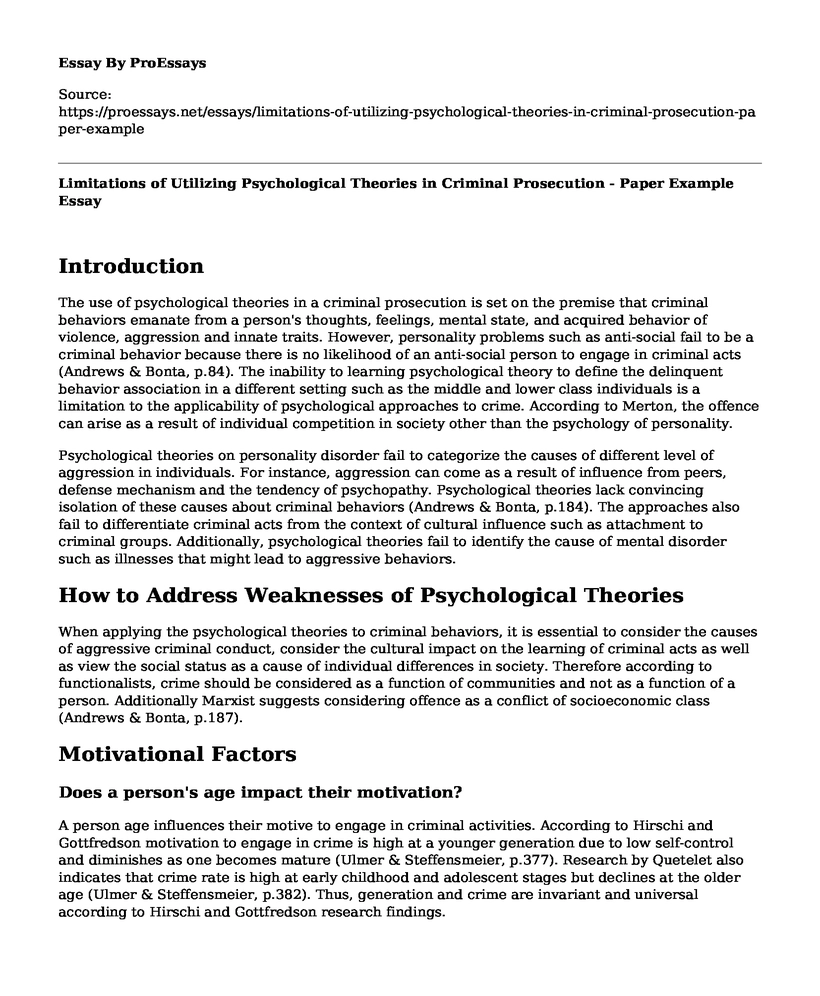Introduction
The use of psychological theories in a criminal prosecution is set on the premise that criminal behaviors emanate from a person's thoughts, feelings, mental state, and acquired behavior of violence, aggression and innate traits. However, personality problems such as anti-social fail to be a criminal behavior because there is no likelihood of an anti-social person to engage in criminal acts (Andrews & Bonta, p.84). The inability to learning psychological theory to define the delinquent behavior association in a different setting such as the middle and lower class individuals is a limitation to the applicability of psychological approaches to crime. According to Merton, the offence can arise as a result of individual competition in society other than the psychology of personality.
Psychological theories on personality disorder fail to categorize the causes of different level of aggression in individuals. For instance, aggression can come as a result of influence from peers, defense mechanism and the tendency of psychopathy. Psychological theories lack convincing isolation of these causes about criminal behaviors (Andrews & Bonta, p.184). The approaches also fail to differentiate criminal acts from the context of cultural influence such as attachment to criminal groups. Additionally, psychological theories fail to identify the cause of mental disorder such as illnesses that might lead to aggressive behaviors.
How to Address Weaknesses of Psychological Theories
When applying the psychological theories to criminal behaviors, it is essential to consider the causes of aggressive criminal conduct, consider the cultural impact on the learning of criminal acts as well as view the social status as a cause of individual differences in society. Therefore according to functionalists, crime should be considered as a function of communities and not as a function of a person. Additionally Marxist suggests considering offence as a conflict of socioeconomic class (Andrews & Bonta, p.187).
Motivational Factors
Does a person's age impact their motivation?
A person age influences their motive to engage in criminal activities. According to Hirschi and Gottfredson motivation to engage in crime is high at a younger generation due to low self-control and diminishes as one becomes mature (Ulmer & Steffensmeier, p.377). Research by Quetelet also indicates that crime rate is high at early childhood and adolescent stages but declines at the older age (Ulmer & Steffensmeier, p.382). Thus, generation and crime are invariant and universal according to Hirschi and Gottfredson research findings.
Does a person's age increase the chances of continued criminal behavior?
According to research findings, an increase in a person's age does not guarantee continued criminal behavior due to a difference in social interaction. For example, the recent F.B.I Uniform Crime Report (UCR) statistics, high rate of crime arrest is prevalent at a tender age (Ulmer & Steffensmeier, p.382). The rationale behind reduced crime rates at old age is because most crimes require energy to become successful. Thus, the elderly and young children refrain from engaging in criminal behaviors because they are physically weak than teenagers.
Works Cited
Andrews, D. A., & Bonta, J. (2014). The psychology of criminal conduct. Routledge.
Ulmer, J. T., & Steffensmeier, D. (2014). The age and crime relationship: Social variation, social explanations. In The nurture versus biosocial debate in criminology: On the origins of criminal behavior and criminality. SAGE Publications Inc.
Cite this page
Limitations of Utilizing Psychological Theories in Criminal Prosecution - Paper Example. (2022, Jul 25). Retrieved from https://proessays.net/essays/limitations-of-utilizing-psychological-theories-in-criminal-prosecution-paper-example
If you are the original author of this essay and no longer wish to have it published on the ProEssays website, please click below to request its removal:
- Legal Challenges Towards Private Security Employees Searches in ACME Electronics Paper Example
- Essay Sample on Childhood Trauma: Acute, Chronic & Complex Effects on Wellness
- Term Paper on Teaching Reading: Cognitive Development & Comprehension
- Essay on Digital Evidence in Courts: Authentication and Relevancy
- Essay Example on Cybercrime: A Growing Threat to Our Digital World
- Essay Example on Anxiety Disorder & Suicidality: Risks & Factors
- Involvement and Learning - Research Paper Example







